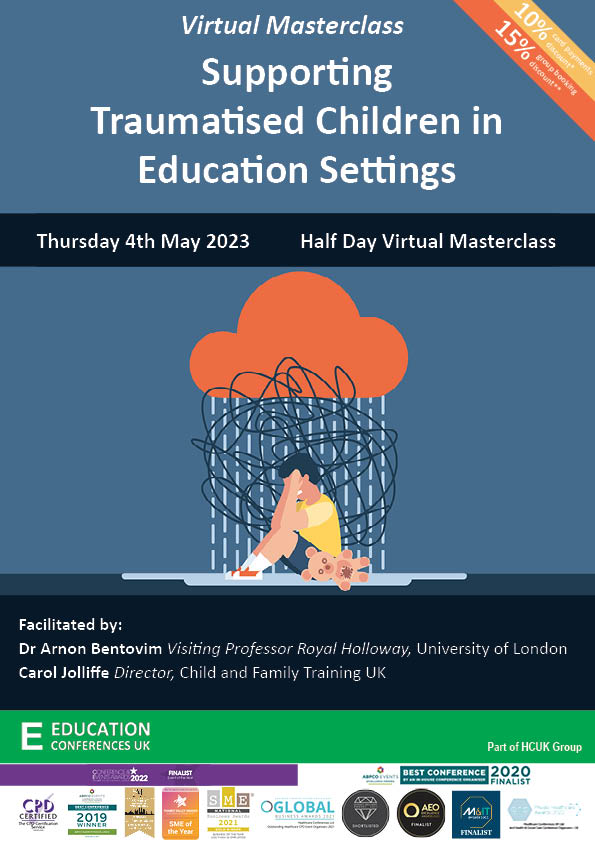Find out more about virtual attendance
Dealing with distress, restoring well-being, and promoting resilience
This is a practical half day Masterclass designed to help you support children and young people who have been exposed to trauma and adversity.
We are all much more aware of the impact of trauma and adversity on children and young people’s lives, and the harmful impact on their education. It is estimated over 40% of mental health conditions in children and young people are associated with adversity, greatly increased during the Covid Pandemic. Schools have an important role to play in supporting those children who have been affected by Trauma and Adversity, to promote resilience, and to help children cope with the inevitable adversities that they will face in life. Join us for this masterclass to consider how to achieve those goals.
Who Should Attend
Senior Mental Health Leads, Designated Teachers, Pastoral Leads, Designated Safeguarding Leads, School Counsellors, School Nurses, SENCOs, members of the SLT should attend.
Masterclass Aims and Objectives
This masterclass will enable you to:
- Have an understanding of the range of potentially Traumatic and Adverse experiences children are exposed to in the Home, and the community including the school
- Appreciate that there are direct forms of experiences – abuse and neglect, and indirect – living in homes or communities where there are high levels of violence
- Appreciate the way potentially Traumatic and Stressful Events are processed – psychologically and physiologically, and the differences between ‘Manageable Stress’ and ‘Toxic Stress’
- Understand short- and long-term impacts and the triggering of a spectrum of overlapping mental health responses, and the impact on education and the classroom.
- Appreciate the range of interventions which can help promote resilience of the school population, and to support the individual presenting with difficulties, assessing their needs and planning how best to help them
- Introduce a range of skills which can be called upon to develop a plan to support children with a variety of needs.
- Consider measures to help schools to adopt a Trauma Informed Approach, a safe environment, trustworthiness, and transparency, fostering collaboration, and mutuality, peer support, empowerment, giving choices and being culturally aware
Facilitators
Arnon Bentovim trained in Psychiatry at the Maudsley Hospital/ Institute of psychiatry, and as a Psychoanalyst, and systemic/ family therapist. He helped to establish the Association and Institute of Family Therapy, and researched measures of family functioning, and clinical approaches at the Institute of Child Health, Great Ormond Street Children’s hospital, and the Tavistock Clinic. He took responsibility for the management of child protection at the Hospital, and he and colleagues established the Child Sexual Abuse Assessment and Treatment Service the first comprehensive service in the UK, and a service to assess the risk and therapeutic needs of maltreated children. Child & Family Training, UK- a not for profit organization - was founded in 2004 to develop and promote multidisciplinary training of evidence -based approaches to assessment, analysis and intervention. Research initially funded by the DofE on common factors in therapeutic work led to the development of UK. The Hope for Children and Family (HfCF) intervention resources. Award –Sept 2014 the International Society for the Prevention of Child Abuse and Neglect recognised Dr Bentovim ‘For his Career Dedicated to the Field of Child Abuse and Neglect and Promotion of Child Rights’. He is Life President of The Lucy Faithfull Foundation.
Carol Jolliffe has worked for Child and Family Training since 2000 and is accredited as a trainer for the range of assessment and intervention tools. She has trained for Child and Family Training in a range of social care and health settings in UK, Ireland, Egypt, Cyprus, Sweden, Germany and Hong Kong. She is currently involved in developing their family work focused training courses. She has worked with children and families in social work and children’s mental health services since 1979. She qualified as a social worker in 1986 and has worked as a practitioner and manager in children’s residential and community settings, including a duty and assessment service and a national therapeutic residential resource. Carol additionally trained as a family therapist (and is also a qualified systemic supervisor) as part of her move to children’s mental health services. She now works as a consultant systemic psychotherapist in an NHS Trust. She has a private clinical practice, offering family therapy and assessments for prospective adopters and foster carers. She teaches on family therapy and clinical psychology training courses for the Tavistock Centre and Canterbury Christchurch University.



